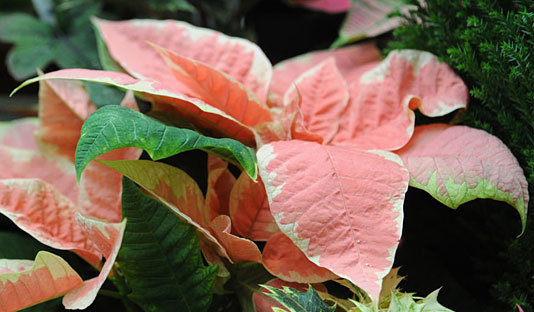






When I started working at Gardener's Supply in the 1990s, my Vermont backyard was pretty green—with grass. Today, there's just a tiny bit of the original lawn left. Most of the available space has given way to trees, shrubs, perennials, annuals and stonework. Watch a slideshow of my garden in Burlington, VT.
In addition to my work at Gardener's Supply, I work in the gardening division at Church Hill Landscapes. In that role, I maintain dozens of gardens and learn a lot in the process. I believe that all gardening is good gardening.

It used to be that poinsettias only came in red, white and pink. Today, there's a much wider range of colors and patterns.
POINSETTIAS are fairly easy to care for. Just be aware that they are especially sensitive to cold. Make sure they're well-protected if you're transporting them on a cold day. Once in your house, they do best with about six hours of sunlight a day. Ideal daytime temperatures are 60-70 degrees F.; at night: 55-65 degrees F. No drafts, no blasting heat ducts.
Most folks treat poinsettias as a holiday annual and toss the plants when they start to deteriorate. But that doesn't sit well with many avid gardeners. You can try to keep a plant and bring it into bloom again. Leonard Perry of the University of Vermont Extension says: "If you do decide to hold your poinsettias until next fall, remember that they need darkness (13 hours, uninterrupted, as in a dark closet) every night from the end of September to Thanksgiving. Just remember to take plants out of the dark during the day and to give bright light. Most find it easier to buy new ones each year, with plants of better quality having been grown under ideal greenhouse conditions. An early December visit to a local greenhouse, full of thousands of plants all in bloom, makes a memorable outing." For more, read his article, Poinsettias for the Holidays.
The other thing to know about poinsettias: They are not poisonous. This rumor has persisted for decades, possibly starting with a report from Hawaii about a fatality that happened 75 years ago. The myth was busted after research done in the 1970s at Ohio State University. However, there are a few holiday favorites—such as mistletoe and holly—that are indeed poisonous. Learn more in Leonard Perry's article, Holiday Plant Toxicity. In general, let the facts and common sense be your guide: Keep poinsettias out of reach of small children.
Copyright © www.100flowers.win Botanic Garden All Rights Reserved